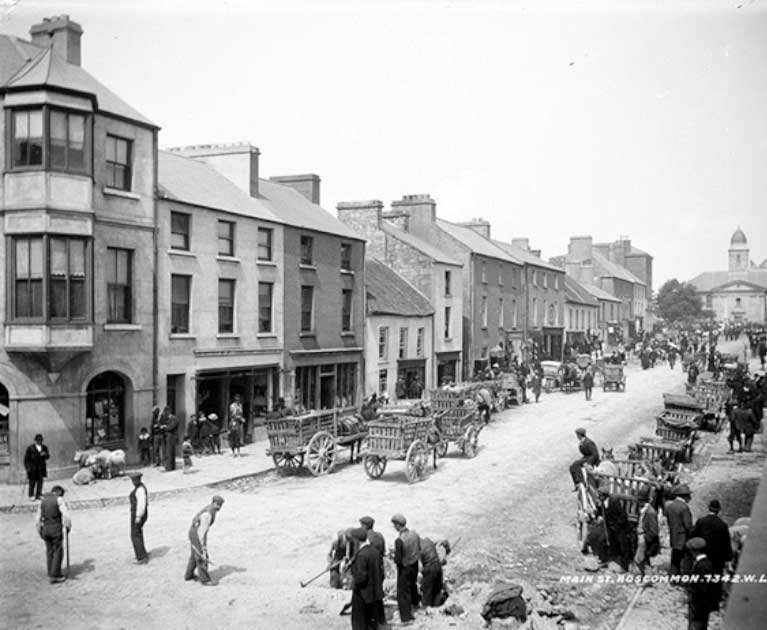Few methods of gainful employment are seen as so morally splattered and distasteful to the modern observer as that of executioner. For some the role would seem to be an abhorrent but necessary evil, and for others the executioner is to be pitied.
There is an obvious skill to the role and a certain strength (and indifference) of character would be required for those who wish to pursue this darkest of professions. But throughout history one thing remains constant: the role of the executioner is seen as almost universally male.
Almost. The Lady Betty of Roscommon story an old tale that has dubious source material to back it up. It may be true but also may just be another superstition. Lady Betty grew the reputation of being a cruel and terrible executioner born in the 18th century around 1740.
This is according to Sir William Wilde, father of the famous Oscar Wilde. According to Sir William, she drew on the walls of her dwelling with a burnt stick the portraits of all of the people she had executed. This haunting woman has had her tale told across the centuries throughout Ireland but who was she and why was she so infamous?
From Poverty to Violence
Lady Betty’s story began in the second half of the 18th century when she was fleeing from her plight as a poor farmer’s widow from County Kerry, Ireland. Betty Sugrue, before she was known as Lady Betty, left with her two children on the walk to Roscommon town all in search of a better life.
It was not an easy journey. One of Betty’s children sadly passed away on the trip leaving only her eldest son Padraic. Fortunately, the two of them made it to Roscommon with no more issues.

In Roscommon, Betty and Padraic sought shelter in a derelict shack and turned to a life of begging and scavenging from the richer parts of town. Unsurprisingly, Betty and her son became reclusive and lived only to keep each other alive. The only support that they had was each other and it is rumored that this is what kept them from succumbing to insanity.
- Cross-Dressing, Globe Trotting? The Extraordinary Jeanne Baret
- The Tavora Executions: An Entire Noble Family Put to the Sword
As part of Betty’s infamy, it was recorded that she had a violent and terrible temper which when combined with the difficulties of poverty and hardship, forced her son to move to America and seek fortune over there. This was not an unusual story as many people from the British Isles attempted to make their riches in America in the 18th century. It was the land of opportunity.
When faced with the decision of staying in poverty with no hope of escape or attempting to make your treasures in the unknown then there is little difficulty making that choice. Betty begged for Padraic to stay but he was determined and promised that he would send support when he could. A hostile relationship began to grow from here.
In April 1775, Padraic began his journey despite the pleas of his mother. Betty became even more of a recluse and hermit without her son to keep her company. She would only leave her house to go to a nearby inn where her son had worked in order to get food.
Padraic, true to his word, did send money and letters but this did nothing to help Betty’s mood and social life. She was too entrenched in her bitterness and angry with the world for the hardness that had befallen her.
Padraic began creating his life on the new continent. He wrote in his letters home that he had joined the Continental Army in New York. This was army was created to fight against the British for American independence.
It was a great place to try and make a name for yourself if you were an impoverished soldier. You could gain fame, recognition, and cash to help you after the war if you did not die. Unfortunately, this meant that his letters to his mother would become more infrequent. Betty became doubtful that he would ever return. This despair would push her over the edge.
A Bad Choice
One cold November night Betty found herself approached by a tall, bearded man who needed shelter for the night. Betty noticed that he was a wealthy stranger because of his clothing and that his pouch was full of gold coins.
The nearby inn was full, and the stranger was happy to stay within Betty’s hovel. She offered him her bed for the night and thought about the opportunity that had presented itself. Her decision did not take long to make. She took a knife and killed him, stealing the money.
- What Became of Anne Bonny, Irish Pirate of the Caribbean?
- Wyoming Prison Baseball: The Inmates who Played for their Lives?
It was not until after she searched the body of the man that she discovered letters, including a letter addressed to her in her son’s handwriting. The stranger had been her son who had wanted to surprise his mother by returning with a small fortune.
Her wails of anguish were heard by locals nearby who brought the town guard with them. She was arrested and imprisoned in the Roscommon Jail. The sentence passed on her was hanging
On the day of her hanging, Betty was led out only to be told that the hangman had been ill. To the surprise of the crowd and the jailers, Betty offered her services as the hangman and proceeded to hang 25 other prisoners. Reports say she was cold and emotionless.
The original hangman never recovered to return to work, and Betty was offered the job permanently. This meant however that she had to remain in prison as it was unsafe for her to walk around town.
Betty was proficient as the executioner. She instructed that the gallows would be better in the prison and the sheriff took her advice. Betty worked with the construction workers and made sure that the public could still see the spectacle without the opportunity of intervening.

Betty’s sentence was commuted, and she was able to continue operating as the executioner throughout the 1798 rising, when her skills were in high demand. She was officially forgiven her sentence in 1802.
Betty retired in her later years and was allowed to tend a garden within the prison confines. Her death came in 1807 and the sheriff demanded she is buried at night in an unnamed place in secret.
As a legacy, Lady Betty was recognized as having given service to the safety of the public in Roscommon. Despite becoming a villain to the people of Roscommon who referred to her as the woman from hell. Betty Sugrue was able to drag herself up from poverty and live a reasonable life, albeit a grim one.
Top Image: Sentenced to death, Lady Betty of Roscommon proved such as good executioner that she saved her own life. Source: LIGHTFIELD STUDIOS / Adobe Stock.
By Kurt Readman